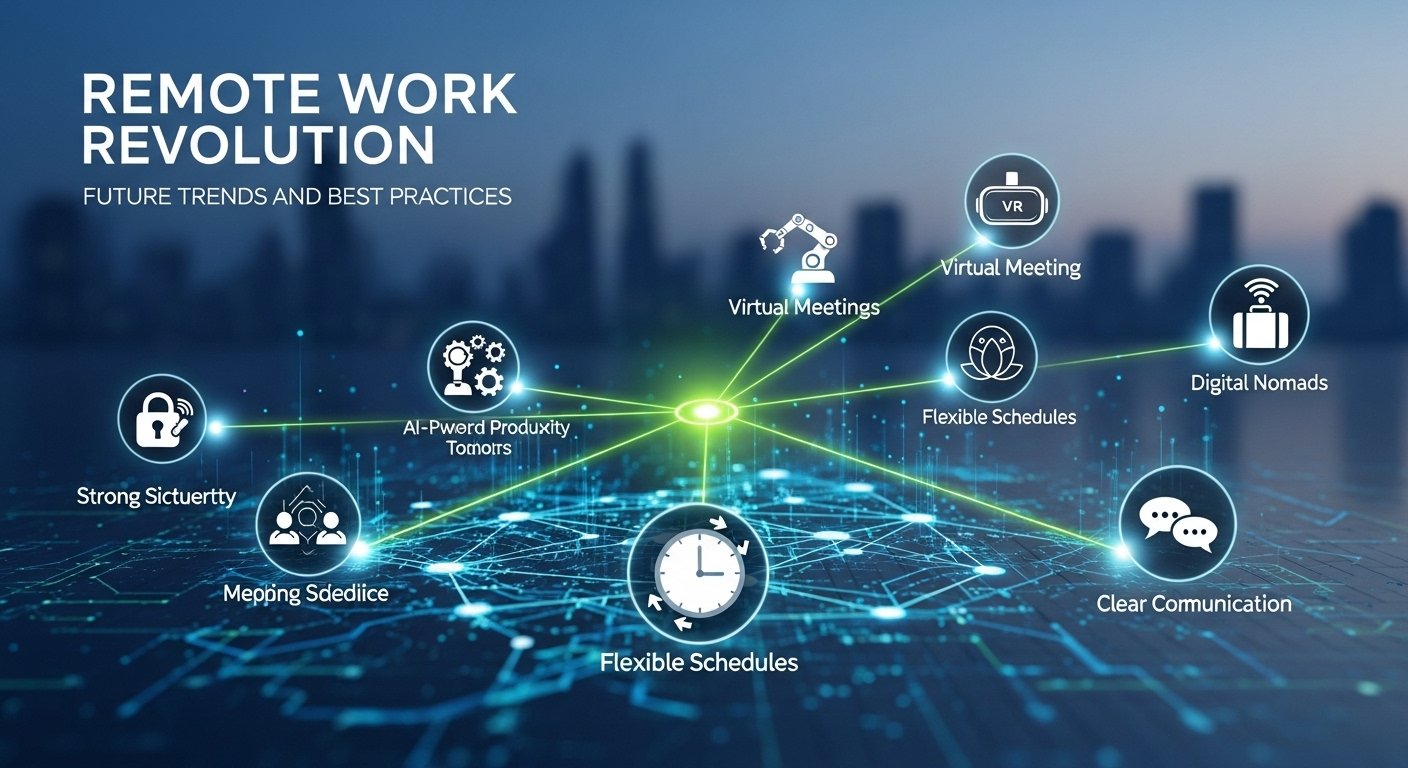 Remote Work Revolution: Future Trends and Best Practices
Remote Work Revolution: Future Trends and Best Practices
In today’s fast-paced world, technology defines how we live and work. Remote work is no longer just a passing trend—it is a revolution shaping the future of employment. Across industries, companies are rethinking traditional methods. Workers are redefining what their careers mean. This global shift affects productivity, communication, and company culture. Teams are experimenting with new ways to stay connected. Managers are adapting to lead from a distance. Employees are balancing flexibility with accountability. These changes are significant, and they are here to stay.
This blog explores the benefits, trends, and best practices of remote work. It also highlights essential tools, challenges, and predictions that will shape the coming years. Whether you are a business leader, HR professional, or remote worker, this guide provides the insights needed to succeed in a remote-first world.
The Benefits of Remote Work
Boosting Productivity Like Never Before
Remote work has proven that productivity is not tied to office walls. Studies consistently show remote employees often outperform their office counterparts. Fewer interruptions allow deeper focus. Workers can design environments that match their preferences—quiet rooms, creative spaces, or even outdoors. Shorter or no commutes save valuable time and energy. Many use that extra time for hobbies, family, or self-development. Flexible schedules also matter. Some people thrive early in the morning, while others perform best at night. Remote work allows both to operate at peak efficiency. The outcome is faster task completion, reduced stress, and higher-quality results. Productivity levels rise higher than ever before.
Cost Savings That Transform Businesses
Remote work saves money for both companies and employees. Businesses reduce expenses on rent, electricity, and office supplies. For startups, these savings can be life-changing, freeing funds for growth and innovation. Some reinvest in new technology, while others expand teams. Employees benefit too. No daily commuting reduces fuel or transport costs. Less spending on work attire or outside meals increases disposable income. The financial relief enhances satisfaction and reduces stress. With lower expenses and more flexibility, remote work creates a win-win situation for everyone.
Enhancing Work-Life Balance
Perhaps the most personal benefit is improved work-life balance. By removing long commutes, workers gain hours of personal time. That time can be spent with family, pursuing hobbies, or simply resting. Remote work empowers professionals to attend important life moments without compromising their careers. This balance reduces burnout and boosts overall job satisfaction. For parents, caregivers, or students, remote flexibility is invaluable. It allows them to manage responsibilities without sacrificing productivity.
Trends in Remote Work
The Rise of Digital Nomadism
One of the most exciting shifts is digital nomadism. Professionals now have the freedom to work from anywhere—a beach in Bali, a mountain cabin, or a café in Paris. This lifestyle attracts those who seek adventure and flexibility. Companies are beginning to embrace digital nomads, recognizing their creativity and adaptability. Hiring them introduces global perspectives and innovative ideas. As internet access improves worldwide, this trend is expected to grow even stronger.
The Shift to Hybrid Work Models
The hybrid model, combining office and remote work, is becoming a preferred choice. Employees enjoy the flexibility of remote days while still connecting face-to-face when needed. This balance supports different working styles and ensures collaboration remains strong. Businesses benefit too. Hybrid setups help retain talent, enhance innovation, and sustain company culture. When implemented well, hybrid models create flexibility without sacrificing connection.
Building Work-From-Home Infrastructure
Strong infrastructure is essential for remote success. Businesses are investing in collaboration tools, secure systems, and ergonomic equipment. Reliable internet ensures smooth communication. Ergonomic furniture reduces health risks. Secure access to company resources keeps workflows efficient. Cybersecurity measures protect sensitive data. Together, these investments form the backbone of effective remote strategies, enabling teams to perform at their best.
Best Practices for Remote Work
Effective Communication is Key
Clear communication is the foundation of remote success. Tools like Slack, Microsoft Teams, and Zoom keep teams connected. Regular check-ins ensure alignment. Virtual meetings build trust and clarity. Transparent goals reduce confusion. With consistent communication, remote teams remain engaged and productive.
Mastering Time Management
Remote work demands discipline. Without structure, boundaries between work and personal life blur. Setting fixed hours improves focus. Creating routines brings balance. Task prioritization ensures deadlines are met. Tools such as Trello or Todoist help track projects efficiently. With strong time management, remote workers maintain productivity while protecting personal time.
Maintaining Team Morale and Connection
Team spirit is harder to build remotely, but it is crucial. Virtual activities like online games, happy hours, or coffee breaks foster bonds. Celebrating achievements motivates employees. Regular check-ins build trust. Even small gestures, such as recognizing effort, create stronger connections. Strong morale keeps remote teams motivated and united.
Tools and Technologies for Remote Work
Software for Seamless Collaboration
Collaboration tools make or break remote work. Slack, Asana, and Trello streamline communication and project management. Video platforms like Zoom and Microsoft Teams enable real-time meetings. These tools keep teams organized, engaged, and productive, no matter where they are.
Hardware to Enhance Productivity
Hardware plays a key role in efficiency. Ergonomic chairs and dual monitors reduce strain and increase comfort. Noise-canceling headphones block distractions. High-performance laptops with fast processors and ample storage ensure smooth workflows. Investing in quality hardware empowers workers to perform effectively.
Security Measures for Peace of Mind
Cybersecurity is a top priority for remote teams. VPNs secure connections. Two-factor authentication adds protection. Strong password practices reduce risks. Regular audits identify vulnerabilities. Training employees builds awareness. A layered approach ensures sensitive data stays safe in remote environments.
Overcoming Challenges of Remote Work
Combating Isolation and Loneliness
Remote work can feel isolating. Companies must encourage social interactions to keep employees connected. Virtual coffee breaks, chat channels, and inclusive practices help reduce loneliness. Building community fosters a sense of belonging, which strengthens engagement and morale.
Minimizing Distractions for Maximum Focus
Distractions at home are inevitable but manageable. A dedicated workspace separates work from personal life. Setting boundaries with household members minimizes interruptions. Productivity methods, like the Pomodoro technique, improve focus. White noise apps or background music create an environment suitable for deep work.
Balancing Work and Personal Life
Maintaining work-life balance is critical. Clear boundaries between work hours and personal time prevent burnout. Regular breaks refresh energy. Self-care promotes long-term health and productivity. Encouraging employees to disconnect after work reinforces balance. Organizations that support this create healthier, happier teams.
Predictions for the Future of Remote Work
A New Era of Workplace Flexibility
The future promises more flexibility than ever. Companies will design policies that allow employees to choose their preferred work settings. This customization increases satisfaction and retention. Flexible workplaces also attract diverse talent, enhancing creativity and success.
Advancements in Virtual Reality and AI
Virtual reality and artificial intelligence are set to revolutionize work. VR will create immersive offices where teams collaborate as if physically present. AI will automate repetitive tasks, freeing employees for strategic work. Together, these tools will make remote work smarter, faster, and more engaging.
Redefining Company Culture
As remote work becomes the norm, company culture must evolve. Organizations will emphasize inclusivity, resilience, and growth. Clear communication builds trust. Feedback keeps employees motivated. Professional development ensures engagement. By adapting culture to virtual environments, businesses can build connected, thriving teams.
Conclusion
The future of remote work is transformative. It is reshaping industries, redefining productivity, and creating more inclusive workplaces. Businesses save costs while employees gain flexibility. Workers enjoy better balance, and companies attract global talent. Success depends on adapting to trends, embracing best practices, and investing in the right tools. Remote work is not temporary—it is the future of employment. Those who embrace it with confidence will lead innovation, growth, and collaboration in the years ahead.









